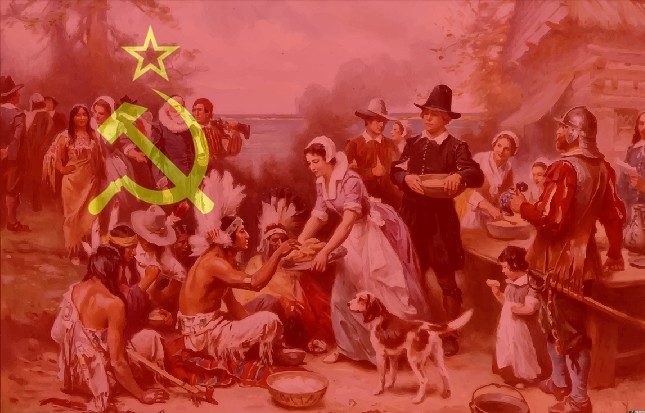Guest post by Dr. Gregory Soderberg
The “first Thanksgiving” is one of the treasured legends of our American beginnings. You can Google the real story later. Less well-known is the Pilgrim’s failed experiment with communism. In these historically-ignorant times, when socialism and communism are sexy again, we can be thankful that the Pilgrims tried a type of communal labor and community ownership–and realized it didn’t work. William Bradford, the governor and chronicler of the Plymouth Plantation, details what happened.
Early in the history of the Plymouth colony, they had planted corn in a communal plot and everyone was expected to take turns working in the fields. But, people quickly offered excuses. The young men didn’t want to work for other men’s wives and families. Those who worked more received the same amount as those who worked less, and resented that. The older men thought it beneath their dignity to work alongside the younger and socially inferior and receive the same rations of food and clothes as everyone else. Wives complained that they were basically slaves who had to work for other men.

Bradford comments: “Upon the point all [having to share] alike, and all to do alike, they thought themselves in the like [same] condition, and one as good as another; and so, if it did not cut off those relations that God hath set amongst men, yet it did at least much diminish and take off the mutual respects that should be preserved amongst them.”
To remedy this situation, they decided to let every man plant and tend his own field. Not surprisingly, “This had very good success; for it made all hands very industrious, so as much more corn was planted than otherwise would have been by any means the Governor or any other could use, and saved him a great deal of trouble, and gave far better content. The women now went willingly into the field, and took their little ones with them to set corn, which before would allege weakness, and inability; whom to have compelled would have been thought great tyranny and oppression.”
Bradford also observes that this disastrous experiment with communal ownership and labor disproved the utopian speculations of past philosophers:
“The experience that was had in this common course and condition [of communal ownership], tried sundry years, and that amongst godly and sober men, may well evince the vanity of that conceit of Plato’s and other ancients, applauded by some of later times—that the taking away of property, and bringing in community into a commonwealth, would make them happy and flourishing; as if they were wiser than God. For this community (so far as it was) was found to breed much confusion and discontent, and retard much employment that would have been to their benefit and comfort.”
Bradford saw that individual ownership is the key to individual responsibility, productivity, and the overall flourishing of the community. This Thanksgiving, take a moment to be thankful for our founding fathers and mothers, who took responsibility for their lives, and laid the foundation for the freedoms and opportunities we enjoy today.
Source:
Bradford’s History of Plymouth Plantation, 1606-1646, p. 146-47 (text modernized & adapted for this article)
__________
Gregory Soderberg teaches at Logos Online School and is a Proctor for the Bible Mesh Institute. He has written for Intellectual Takeout and blogs regularly at The SoderBlog. He holds a Ph.D. in historical theology from the Free University of Amsterdam.

Pingback: This Thanksgiving, Be Thankful the Pilgrims Tried Communism–And It Didn’t Work – The SoderBlog
Pingback: This Thanksgiving, Be Thankful the Pilgrims Tried Communism–And It Didn’t Work – Chalmers Fellowship
4
5